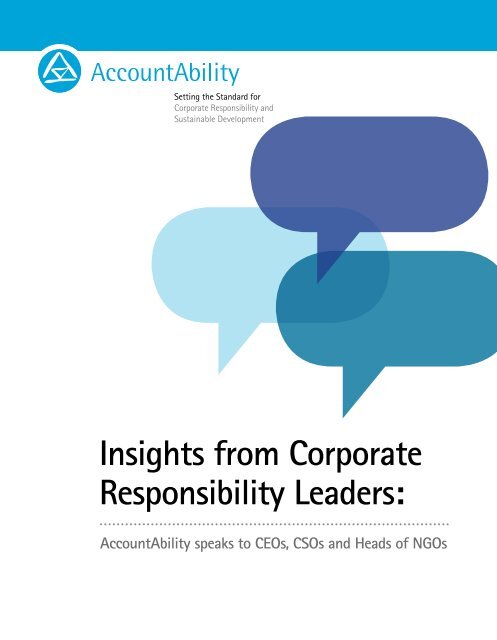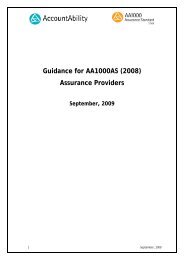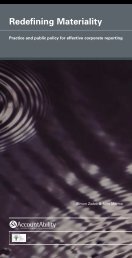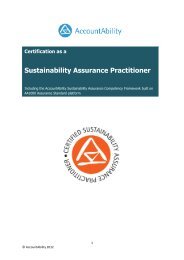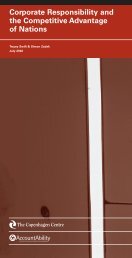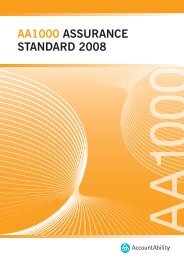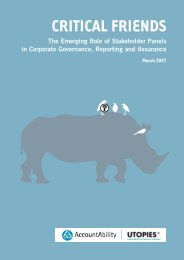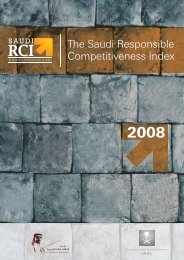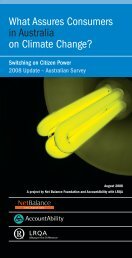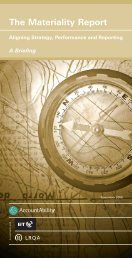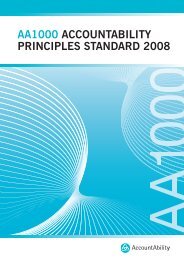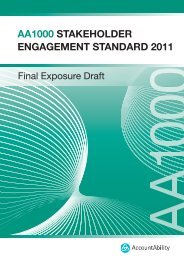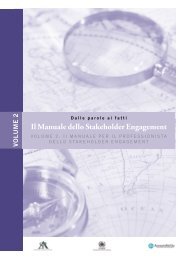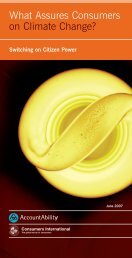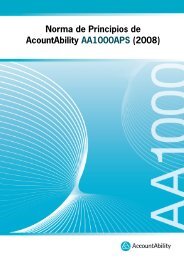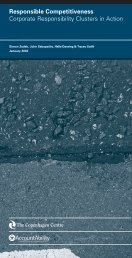Insights from Corporate Responsibility Leaders: - AccountAbility
Insights from Corporate Responsibility Leaders: - AccountAbility
Insights from Corporate Responsibility Leaders: - AccountAbility
Create successful ePaper yourself
Turn your PDF publications into a flip-book with our unique Google optimized e-Paper software.
Setting the Standard for<br />
<strong>Corporate</strong> <strong>Responsibility</strong> and<br />
Sustainable Development<br />
<strong>Insights</strong> <strong>from</strong> <strong>Corporate</strong><br />
<strong>Responsibility</strong> <strong>Leaders</strong>:<br />
<strong>AccountAbility</strong> speaks to CEOs, CSOs and Heads of NGOs
CONTENTS<br />
Introduction ................................................1<br />
Jeff Swartz<br />
CEO of Timberland ...........................................2<br />
Carol Atwood<br />
Entrepreneur and <strong>AccountAbility</strong> Advisory Council Member .........4<br />
Rob Cameron<br />
CEO of Fairtrade International .................................7<br />
Bob Langert<br />
Vice President of Sustainability at McDonald’s Corporation ........10<br />
Caroline Roan<br />
Vice President of <strong>Corporate</strong> <strong>Responsibility</strong> and Reputation at<br />
Pfizer Inc. and President of the Pfizer Foundation ................13<br />
About <strong>AccountAbility</strong><br />
<strong>AccountAbility</strong> is a leading global organization providing innovative<br />
solutions to the most critical challenges in corporate responsibility<br />
and sustainable development. Since 1995 we have been helping<br />
corporations, non-profits and governments embed ethical,<br />
environmental, social, and governance accountability into their<br />
organizational DNA. Our unique value proposition brings together<br />
leading-edge research, widely-recognized standards and strategic<br />
advisory services to deliver practical solutions for our clients.
Introduction<br />
<strong>Corporate</strong> responsibility and sustainable development evolve due to the initiatives<br />
of bold, forward-thinking and passionate leaders. These leaders—CEOs, CSOs,<br />
Heads of NGOs, Social Entrepreneurs, and Researchers—are changing the way we<br />
think about business.<br />
<strong>AccountAbility</strong> interviews influential corporate responsibility leaders about their<br />
insights, experiences, and the lessons they learned. This publication shares highlights<br />
<strong>from</strong> our conversations with five international leaders:<br />
• Jeff Swartz, CEO of Timberland, on how his company created an online stakeholder<br />
engagement platform<br />
• Carol Atwood, entrepreneur and <strong>AccountAbility</strong> Advisory Council Member, on how<br />
the movie Avatar presents a lesson in the changing nature of stakeholder engagement<br />
• Rob Cameron, CEO of Fairtrade International, on how Fairtrade is achieving success<br />
for both companies and producers<br />
• Bob Langert, Vice President of Sustainability at McDonald’s Corporation,<br />
on the importance of listening to critics and<br />
engaging them in problem-solving<br />
• Caroline Roan, Vice President of <strong>Corporate</strong><br />
<strong>Responsibility</strong> and Reputation at Pfizer Inc.<br />
and President of the Pfizer Foundation, on<br />
why corporate responsibility activities are<br />
integral to building brand and reputation<br />
To read the full interviews,<br />
visit our website:<br />
www.accountability.org<br />
1
<strong>Insights</strong> <strong>from</strong> <strong>Corporate</strong> <strong>Responsibility</strong> <strong>Leaders</strong><br />
Jeff Swartz<br />
Timberland CEO<br />
Jeff Swartz wears many hats. In addition to his signature Boston Red Sox cap, he’s a<br />
self-described “third generation entrepreneur” at the helm of Timberland, maker of<br />
the iconic yellow boot and other outdoor wear; a “Prophet CEO” who blends<br />
capitalism with activism on the belief that “profit and purpose belong together”;<br />
and a social media enthusiast who actively shares his opinions on sustainability and<br />
accountability on Twitter.<br />
<strong>AccountAbility</strong>: Timberland is among a handful of companies shifting to a quarterly<br />
sustainability reporting cycle—what was the rationale behind this enhanced<br />
transparency? Has your experience matched your aspirations?<br />
We made the shift to quarterly<br />
reporting in large part as a result of<br />
our stakeholders; as they became more<br />
sophisticated in their understanding of<br />
sustainability issues, they also started<br />
demanding greater information about<br />
our CSR initiatives.<br />
Jeff Swartz: We made the shift to quarterly<br />
reporting in large part as a result of our<br />
stakeholders; as they became more sophisticated<br />
in their understanding of sustainability issues,<br />
they also started demanding greater information<br />
about our CSR initiatives. We talk a lot about<br />
being transparent and accountable, and quarterly<br />
reporting was an opportunity for us to put our<br />
money where our mouth was, by providing more<br />
accessible, relevant and timely information about<br />
how we’re measuring up in our CSR efforts.<br />
We also made the change in order to give our CSR<br />
performance the same importance as our financial<br />
performance; we report our financial results every<br />
90 days, and as a company that’s committed to<br />
creating social and environmental value in addition<br />
to financial value, we felt it was an important<br />
“signal” to our stakeholders for us to treat our CSR<br />
results the same way, with the same frequency.<br />
AA: Timberland also introduced quarterly<br />
stakeholder calls hosted by you, giving stakeholders rare access to a CEO. How does<br />
this input help Timberland with its sustainability strategy and practice?<br />
JS: Hosting quarterly stakeholder calls focusing on critical issues for our company<br />
helps to reinforce the importance of the four pillars of our CSR strategy (energy,<br />
products, workplaces, community service). We purposefully invite speakers with<br />
2
different opinions and target experts,<br />
employees, and other stakeholders to<br />
challenge and learn with us. We use the calls<br />
to discuss challenges we face as an individual<br />
company or as an industry, and we believe<br />
they can serve as a platform for both<br />
information sharing and improved strategy.<br />
No one entity or organization can<br />
impact sustainable change as<br />
effectively as a group of entities or<br />
organizations. Collaborations bring<br />
greater leverage, a greater diversity of<br />
ideas and solutions, and more resources.<br />
As for providing rare access to a CEO… my<br />
wife will tell you I’ll talk to anyone who will<br />
give me half an ear. As someone who’s been<br />
called a “CSR zealot,” NOT hosting these<br />
calls isn’t an option for me. The subject<br />
matter is something I take seriously and<br />
believe in passionately … I’d stay on the line<br />
all day, if they’d let me.<br />
AA: Timberland launched the Voices of<br />
Challenge online stakeholder engagement platform, harnessing the power of social<br />
media for enhanced accountability. What are the challenges, benefits, and lessons of<br />
this new form of online engagement?<br />
JS: Voices of Challenge gives us an opportunity to interact with more stakeholders<br />
in new ways, to learn, engage and ultimately enhance our CSR agenda <strong>from</strong> ideas<br />
that are presented or discussed. The benefits of the platform have been our ability<br />
to scale and broaden the conversation and also to have a two-way dialogue with<br />
thought leaders, practitioners, NGOs, investors, students, and even consumers.<br />
We’ve been challenged by the typical things that social media presents—real time<br />
engagement, possible dominance on the site by one stakeholder over another, and<br />
the general nature of an open forum.<br />
AA: How do you work beyond the boundaries of your own company, collaborating<br />
with other companies, NGOs, government, and others in collective action to promote<br />
broader systemic change toward a more sustainable economy?<br />
JS: I don’t care how powerful or passionate they are—no one entity or organization<br />
can impact sustainable change as effectively as a group of entities or organizations.<br />
Collaborations bring greater leverage, a greater diversity of ideas and solutions,<br />
more resources … our experience as part of the Outdoor Industry Association<br />
Eco-working Group is one example, and there are other groups and efforts like that<br />
in which we’ve been able to influence greater change as part of a larger effort than<br />
we’d be able to alone.<br />
<br />
3
<strong>Insights</strong> <strong>from</strong> <strong>Corporate</strong> <strong>Responsibility</strong> <strong>Leaders</strong><br />
Carol Atwood<br />
Entrepreneur and <strong>AccountAbility</strong> Advisory Council Member<br />
Carol Atwood’s career embodies the convergence of characteristics and<br />
principles governing non-profit and profit organizations: social entrepreneurship.<br />
Her chosen strategy: use business, finance, and media to leverage<br />
opportunities for making a positive difference. As a member of <strong>AccountAbility</strong>’s<br />
Advisory Council, she provides strategic guidance and facilitates <strong>AccountAbility</strong>’s<br />
mission of advancing corporate responsibility and sustainability by<br />
increasing the impact of its standards, shaping a leading research agenda, and<br />
delivering transformative service solutions. Carol Atwood founded Spartacus<br />
Media Enterprises to increase the flow of capital to media and education for<br />
social change. She is a recipient of many awards, including “NYC Entrepreneur<br />
of the Year” award, which was sponsored by NASDAQ, Kaufmann Foundation,<br />
and Ernst and Young.<br />
<strong>AccountAbility</strong>: You’ve participated in many cross-sector and public-private<br />
partnerships. What key qualities do you look for in partnership initiatives? And<br />
what warning signs alert you to possible problems—particularly when multiple<br />
parties are involved?<br />
Carol Atwood: We are living in a world in which cross-sector and public-private<br />
partnerships have become essential to all stakeholders’ core missions. Whether on a<br />
global, country or local level, the world has transformed in such a way that the old<br />
boundaries of ‘siloed sectors’ have become blurred. In fact, many discrete sectors are<br />
converging with others and are in the process of re-forming in ways that have not yet<br />
been determined. Plus, we now live in a world where perhaps we may never truly reform<br />
in any permanent sense. The new rules appear to be that change is iterative, requiring<br />
flexibility to adapt with every new seismic shift in world populations (such as the<br />
current so called Arab Spring) or technology (the latest kind of social media tools).<br />
AA: Can you give us a tangible example?<br />
CA: Here’s a well-known illustration, <strong>from</strong> the silver screen, on the need for<br />
cross-sector partnerships. I have been focusing so much of my time lately on the<br />
levers that allow better stakeholder engagement, to ensure marginalized people and<br />
environments of the world are empowered to build sustainable communities<br />
(financially, socially and environmentally). That’s why I would like to frame my<br />
thoughts using the struggles, opportunities, and lessons portrayed in the movie Avatar.<br />
4
Avatar is a metaphor for the changing<br />
landscape I described, and how it affects:<br />
• who is considered a stakeholder<br />
• the need for everyone to recognize<br />
cross-sector partnerships are not just as<br />
additive to their core missions, but now<br />
are essential to their success; and<br />
The new rules appear to be that change<br />
is iterative, requiring flexibility to adapt<br />
with every new seismic shift in world<br />
populations (such as the current so<br />
called Arab Spring) or technology (the<br />
latest kind of social media tools).<br />
• the rules of engagement, which affect<br />
the voices of those who were once<br />
perceived to be disenfranchised and<br />
therefore not involved. Now they have a voice, through advocates, governments, new<br />
rules of law, social media, smart phones, and other emerging disruptive technologies.<br />
AA: So how does this relate to Avatar?<br />
CA: Well, in the film, you have a classic struggle of those who live on the land, love the<br />
land, and assume that they will forever be formally or informally deeded that land. They are<br />
the blue-skinned humanoids that represent all indigenous people in our world. Their world is<br />
called Pandora.<br />
You also have other actors: the mining corporation, called RDA, which is extracting a<br />
valuable mineral called “unobutanium,” and is shown as not acknowledging the interests of<br />
anyone but the shareholders. So they represent, in our world, all corporations, and their<br />
perception (in a traditional sense) as beholden only to those who have provided funding.<br />
Then you have the government’s military, which in Avatar upholds the corporation’s view of<br />
the world—meaning it listens only to the shareholder. In our real world, governments often<br />
play this role, too, as the US has with its oil interests in the Middle East. Politicians see their<br />
positions jeopardized if their constituents’ consumption desires are threatened.<br />
So, in Avatar, on Pandora, you have the consumers of unobutanium helping to drive the<br />
support that the government provides to the company, RDA, and its worldview of who are<br />
the primary stakeholders whose needs should be represented.<br />
Then you have the advocates. In the movie, a character named Grace Augustine heads up<br />
the “Avatar Program.” It’s similar, in our world, to the not-for-profit and advocacy sectors<br />
that support local lands and indigenous peoples affected by corporate interests.<br />
To return to your question: In this classic worldview, the possible multi-stakeholder<br />
problems you refer to play out in Avatar. This world view of capitalism has been on shaky<br />
ground for some time, and the efficacy of it—with the deep recession and the acceleration<br />
of social media, smart phones and other world forces resulting <strong>from</strong> these two factors—has<br />
left us in a place of troubled uncertainty.<br />
5
<strong>Insights</strong> <strong>from</strong> <strong>Corporate</strong> <strong>Responsibility</strong> <strong>Leaders</strong><br />
In the new world order, corporations,<br />
governments, not-for-profits,<br />
indigenous people—they all need each<br />
other for their core mission to work.<br />
AA: What does all of this have to do with cross sector and public-private<br />
partnerships? What are the key qualities for choosing partnerships?<br />
CA: In a different world than we live in now, a new world, shareholders are not the only<br />
stakeholder or partner. In the new world order, corporations, governments, not-for-profits,<br />
indigenous people—they all need each other for their core mission to work. And those who<br />
don’t have powerful voices in the mix in any substantive way—well, those are the people who<br />
are now suddenly front and center, bringing down governments in a week. They’re demanding<br />
to be part of the process, of building products, creating their own goods and services and<br />
trading amongst themselves, thus leaving the traditional capitalist frameworks behind.<br />
In the new world order, the themes that played out in Avatar—with the struggles among the<br />
rights of indigenous people, the corporations, the government, the military, and those who<br />
consume the corporation’s products—acknowledge that all of the players are stakeholders. It<br />
suggests that for stakeholders to achieve ultimate success, engagement amongst them must<br />
take place.<br />
<br />
6
Rob Cameron<br />
CEO of Fairtrade International<br />
Rob Cameron is CEO of Fairtrade International, the central body that sets Fairtrade<br />
standards, develops global strategy, supports producers, and promotes trade justice<br />
around the world. Fairtrade is the most widely-recognized ethical label in the world,<br />
according to a comprehensive study of 17,000 consumers in 24 countries. More<br />
than 80 percent of consumers recognize the Fairtrade Mark in the UK, Ireland,<br />
Switzerland, Netherlands, Austria and Finland. Despite a difficult economic climate,<br />
Fairtrade sales have grown consistently, in the process strengthening local producers<br />
and improving the lives of millions of people in the developing world. Prior to taking<br />
on the leadership role at Fairtrade in 2007, Rob was the owner and executive<br />
chairman of Flag, an international sustainability and CSR communication firm. In<br />
addition, he has served with many organizations in the CR arena, most notably as a<br />
UK Prince of Wales’ Ambassador for <strong>Corporate</strong> <strong>Responsibility</strong>.<br />
<strong>AccountAbility</strong>: What is Fair Trade? What is Fairtrade?<br />
Rob Cameron: The term Fair Trade is used to refer to a concept and a broader<br />
movement which seeks to provide producers a fairer trade deal. The most widely<br />
recognized definition of Fair Trade was created by an informal association of the<br />
four main Fair Trade networks (Fairtrade International, World Fair Trade Organization,<br />
Network of European World Shops and European Fair Trade Association).<br />
The term Fairtrade is used to describe the certification and labeling system<br />
governed by Fairtrade International. Fairtrade offers farmers and workers in<br />
developing countries a better deal and the opportunity to improve their lives and<br />
plan for their future. Consumers can identify goods that have met Fairtrade<br />
Standards via the international FAIRTRADE Certification Mark, an independent<br />
product label.<br />
A product with the FAIRTRADE Mark means independent certification against the<br />
Fairtrade Standards at each step of the supply chain. An independent certification<br />
company FLO-CERT certifies all Fairtrade producer organizations. FLO-CERT or the<br />
national labeling initiatives (Fairtrade organizations in consumer countries) certify<br />
the trading companies.<br />
AA: What are some of the problems Fairtrade seeks to address?<br />
RC: Not all trade is fair. Farmers and workers at the beginning of the chain don’t<br />
always get a fair share of the benefits of trade. Fairtrade enables consumers to put<br />
this right.<br />
7
<strong>Insights</strong> <strong>from</strong> <strong>Corporate</strong> <strong>Responsibility</strong> <strong>Leaders</strong><br />
For a product to be labeled with the FAIRTRADE Certification Mark, certain<br />
standards must be met which cover areas such as pricing, financing, contracts,<br />
labor rights, environment, and democracy.<br />
There are two distinct sets of Fairtrade Standards, which address different types of<br />
disadvantaged producers. One set of standards applies to smallholders that are<br />
working together in co-operatives or other organizations with a democratic<br />
structure. The other set applies to workers, whose employers pay decent wages,<br />
guarantee the right to join trade unions, ensure health and safety standards and<br />
provide adequate housing where relevant.<br />
Not all trade is fair. Farmers and<br />
workers at the beginning of the chain<br />
don’t always get a fair share of the<br />
benefits of trade. Fairtrade enables<br />
consumers to put this right.<br />
Fairtrade Standards also cover terms of trade.<br />
Most products have a Fairtrade Price, which is the<br />
minimum that must be paid to the producers. This<br />
price aims to ensure that producers can cover<br />
their average costs of sustainable production and<br />
acts as a safety net for farmers at times when<br />
world markets fall below a sustainable level.<br />
Without this, farmers are completely at the mercy<br />
of the market.<br />
Producers also get an additional sum, the<br />
Fairtrade Premium, which goes into a communal<br />
fund for workers and farmer to improve social,<br />
economic and environmental conditions. Such<br />
funds are typically invested in education and<br />
healthcare, farm improvements to increase yield<br />
and quality, or processing facilities to increase<br />
income.<br />
AA: What drives the uptake of Fairtrade<br />
certification? Push <strong>from</strong> producers/retailers? Pull<br />
<strong>from</strong> consumers?<br />
RC: Both. We’ve seen great success in markets where there are awareness-raising<br />
campaigns among consumers, for example through the Fairtrade Towns campaign<br />
(fairtradetowns.org), and then the major retailers are brought on board. A number<br />
of retailers have made important commitments to Fairtrade. For example, 100<br />
percent of the bananas sold in Sainsbury’s are Fairtrade certified. Both UK and<br />
Germany have reported that supermarkets are expanding the range of Fairtrade<br />
products within their own-brand product portfolios.<br />
8
AA: What are the major<br />
challenges for Fairtrade<br />
going forward?<br />
RC: Climate change and<br />
workers rights are the<br />
two big issues for us.<br />
To vulnerable farmers, climate change<br />
is a reality that threatens their<br />
livelihood. Fairtrade is therefore calling<br />
upon world leaders, at COP17 and<br />
beyond, to prioritize policies geared to<br />
agriculture dependent communities.<br />
Farmers are often<br />
overlooked in the current<br />
climate change policy<br />
frameworks. For example,<br />
climate change has<br />
wiped out nearly half of the 10 million coffee trees the members of the Fairtrade<br />
Mzuzu Coffee Planters Cooperative Union in Malawi have planted since 2003.<br />
Elsewhere, some Fairtrade producers have experienced as much as a 28 percent<br />
yield reduction due to climate change. To vulnerable farmers, climate change is a<br />
reality that threatens their livelihood. Fairtrade is therefore calling upon world<br />
leaders, at COP17 [17th Conference of the Parties to the United Nations Framework<br />
Convention on Climate Change] and beyond, to prioritize policies geared to<br />
agriculture dependent communities.<br />
In regard to workers rights, despite our rigorous standards and certification system,<br />
we know that workers can face many barriers, some subtle, some overt, to enjoying<br />
quality work conditions and to forming or joining a union, even in Fairtrade. That’s<br />
why we’ve launched a major program to deepen Fairtrade’s impact for workers and<br />
hired laborers.<br />
Beyond these issues, the challenge of course, is always to take Fairtrade to scale.<br />
We’ve had very good growth since our beginnings, and now we want Fairtrade to<br />
reach millions more farmers and workers to transform the way trade is done.<br />
<br />
9
<strong>Insights</strong> <strong>from</strong> <strong>Corporate</strong> <strong>Responsibility</strong> <strong>Leaders</strong><br />
Bob Langert<br />
Vice President, Sustainability, McDonald’s Corporation<br />
Bob Langert joined McDonald’s in 1983, beginning his career as a logistics<br />
specialist before moving into corporate responsibility. What began 23 years ago<br />
as a short-term assignment on a project team tasked with removing CFLs<br />
(chlorofluorocarbons) <strong>from</strong> the company’s packaging gradually expanded into his<br />
current role as head of McDonald’s entire global CR effort. Along the way Bob<br />
has worked with Greenpeace, WWF, the Environmental Defense Fund, Conservation<br />
International, and legendary animal rights activist, Dr. Temple Grandin.<br />
<strong>AccountAbility</strong>: Describe McDonald’s CR journey. Where have you come <strong>from</strong>?<br />
Where are you headed?<br />
McDonald’s serves more than 60<br />
million people a day. If we can get our<br />
1.7 million people engaged, we’re going<br />
to be able to mainstream sustainability<br />
in a big way.<br />
Bob Langert: If I had to put it into a<br />
headline, I’d say we’re migrating <strong>from</strong><br />
corporate social responsibility to<br />
sustainability. We’re moving away <strong>from</strong><br />
CSR terminology as something that’s too<br />
narrowly perceived both within<br />
McDonald’s and externally as dealing with<br />
social issues and philanthropy.<br />
The future is sustainability defined as the<br />
core of what we do. It is about our core<br />
business and how we intersect with<br />
society. It’s the idea of creating shared<br />
value. Sustainability isn’t just about doing<br />
the right thing. It’s also about doing something<br />
that’s going to benefit our company.<br />
There’s no need to be bashful about creating value because that’s what’s going<br />
to make our work sustainable and bring value to society at the same time.<br />
AA: Is “mainstreaming” sustainability more difficult for a company like<br />
McDonald’s with a franchise business model?<br />
BL: Yes and no. In some companies decrees come down <strong>from</strong> on high and<br />
everybody gets on board pretty quickly. But that’s not how our system works.<br />
Eighty-five percent of our system is made up of independent owner operators,<br />
true entrepreneurs.<br />
10
It can be difficult to rally this many people. However, the reward for it is phenomenal.<br />
If you define sustainability as truly embedding it in your organization so that people<br />
want to do it, as we get our system and suppliers and staff people and owner/<br />
operators educated and aware, sustainability gets locked in. People are doing it<br />
because they see the value for their business, and for connecting with customers.<br />
McDonald’s serves more than 60 million<br />
people a day. If we can get our 1.7 million<br />
people engaged, we’re going to be able to<br />
mainstream sustainability in a big way.<br />
AA: You talk about economic impact as a<br />
neglected pillar of sustainability, how so?<br />
BL: For most employees, the true measure of<br />
sustainability is that the company they work<br />
for stays in business, and they can keep their<br />
jobs and they can sustain their families.<br />
However, in most of the CR initiatives I see, or<br />
the CR frameworks that are out there—<br />
“people, planet, profit” or “ethics, environment,<br />
economics”—it seems that keeping the<br />
company in business, providing jobs, and<br />
paying taxes is an afterthought.<br />
Profit shouldn’t be a<br />
dirty word. It’s the key<br />
component of making<br />
something sustainable.<br />
Profit shouldn’t be a dirty word. It’s the key<br />
component of making something sustainable.<br />
AA: What initiatives are you most proud of?<br />
BL: I’m most proud of things that we do that have a multiplier effect of<br />
changing things.<br />
Our work with the Environmental Defense Fund changed packaging for our industry,<br />
with more unbleached fiber, more recycled content, reduced waste, less packaging.<br />
We did the same with animal welfare working with Dr. Temple Grandin who had<br />
these blue sky ideas about how animals should be treated within the supply chain.<br />
It’s been a long journey, but we’ve incorporated her animal welfare standards and<br />
audits into McDonald’s system globally, in 500 facilities around the world. We’ve<br />
basically made a standard operating procedure for the animal agricultural industry,<br />
and for the fast food industry to look at animal welfare not as a peripheral issue,<br />
but as part of doing business.<br />
11
<strong>Insights</strong> <strong>from</strong> <strong>Corporate</strong> <strong>Responsibility</strong> <strong>Leaders</strong><br />
We called up Greenpeace and said,<br />
“We agree with you. So, now what do<br />
you want to do about it? You can’t just<br />
be targeting McDonald’s alone. This is a<br />
larger issue.” Working with Greenpeace,<br />
we recruited other retailers.<br />
Let me give you one more example.<br />
A few years ago activists <strong>from</strong> Greenpeace showed up in our restaurants in the UK<br />
dressed in chicken suits to call attention to excessive soya farming in Brazil, and<br />
how it was destroying the Amazon rainforest. We were caught completely by<br />
surprise because we don’t get involved in buying soya. Our suppliers do. It’s an<br />
upstream ingredient. Soya is largely exported <strong>from</strong> Brazil to European markets for<br />
animal feed. It feeds the chickens that we use to make McNuggets.<br />
The reality is McDonald’s purchased through our suppliers, maybe one-half of one<br />
percent of soya. It wasn’t a matter of us being a huge user. It was more a case of<br />
using McDonald’s to draw attention to an issue. And Greenpeace drew our attention.<br />
We quickly verified that the report was accurate, that there were legitimate issues<br />
of increased soya farming causing rainforest destruction. And within just one day,<br />
our leadership said, “We don’t want to be part of that. That’s not who we are. And<br />
we’re not going to buy things that destroy the rainforest.”<br />
So, we called up Greenpeace and said, “We agree with you. So, now what do you<br />
want to do about it? You can’t just be targeting McDonald’s alone. This is a larger<br />
issue.” Working with Greenpeace we recruited other retailers. We got suppliers<br />
involved, traders in Brazil, other NGOs. And believe it or not, within three months, a<br />
moratorium was announced on those practices and that moratorium has stuck.<br />
When you’re part of making something happen that all parties are happy with, and<br />
you make an improvement like that that sticks, you feel good. When McDonald’s<br />
does something, the ripple effect can be tremendous.<br />
<br />
12
Caroline Roan<br />
Vice President of <strong>Corporate</strong> <strong>Responsibility</strong> and Reputation at Pfizer Inc.;<br />
President of the Pfizer Foundation<br />
Caroline Roan proudly wears “two hats” at Pfizer—one hat for the company and one<br />
for the corporate foundation. She began her corporate responsibility journey<br />
focusing on behavioral health, first at Yale University’s Department of Epidemiology<br />
and Public Health, then at the Robert Wood Johnson Foundation as a member of the<br />
Foundation’s Community Health Team. From there Caroline moved into the<br />
corporate world at Pfizer, starting out in philanthropy, and subsequently broadening<br />
her professional portfolio to encompass corporate reputation, corporate advertising,<br />
and corporate responsibility (CR). She currently serves on the Conference Board’s<br />
<strong>Corporate</strong> Contributions Council and the Lincoln Center <strong>Corporate</strong> Fund’s <strong>Leaders</strong>hip<br />
Committee. Caroline has an undergraduate degree in sociology and anthropology<br />
<strong>from</strong> Earlham College and an M.P.A. <strong>from</strong> the School of International and Public<br />
Affairs at Columbia University.<br />
<strong>AccountAbility</strong>: It’s interesting to<br />
see how Pfizer has decided to link<br />
Reputation, Brand, and <strong>Corporate</strong><br />
<strong>Responsibility</strong>. Tell us the rationale<br />
for that.<br />
Caroline Roan: When we think of<br />
<strong>Corporate</strong> <strong>Responsibility</strong> at Pfizer,<br />
we think of it as the “How” in how<br />
we do business. Nothing influences<br />
our reputation more than how we<br />
do our business. So putting our<br />
corporate reputation efforts<br />
together with corporate<br />
responsibility seemed a natural<br />
extension of this concept.<br />
If we really begin to integrate corporate<br />
responsibility into our business strategy, then<br />
we can and should be in the front seat despite<br />
earnings pressures. In order to make this<br />
happen, we need to move beyond thinking of<br />
CR as a “nice to have” and rather look at how<br />
we grow markets and our business within a<br />
responsibility framework.<br />
Brand is the “What” we do. Our<br />
corporate brand builds <strong>from</strong> our<br />
core business and product areas and their value proposition and potential for differentiation<br />
in the marketplace. In contrast, reputation is the sum total of all of our stakeholders’<br />
individual perceptions based on how we operate, interact and communicate as a company.<br />
After all, the expectations of stakeholders are what ultimately drive reputation. In short, we<br />
create our brand but earn our reputation.<br />
13
<strong>Insights</strong> <strong>from</strong> <strong>Corporate</strong> <strong>Responsibility</strong> <strong>Leaders</strong><br />
One of our challenges is that the corporate brand is less recognized than our product<br />
brands. When you think of Pfizer, you think of a house of brands, rather than a branded<br />
house. Now that’s fine. We want people to think of our products, because the heart of what<br />
we do is discovering, developing and bringing to market new medicines. But, that poses<br />
challenges—and opportunities—for us as we try to tell the Pfizer business story.<br />
AA: What do you see as the biggest CR-related reputational challenges for the<br />
industry today? How are you handling these at Pfizer?<br />
CR: Access and pricing, and safety of medicines remain key issues facing the industry and<br />
Pfizer. In terms of access to medicines, we are engaged in research partnerships to develop<br />
medicines for diseases like malaria, HIV, and neglected tropical diseases. Our approach has<br />
been two-pronged. First, we invest in projects <strong>from</strong> a commercial perspective like the<br />
advance market commitment with GAVI (Global Alliance for Vaccines and Immunization)<br />
and second, <strong>from</strong> a philanthropic commitment to improve access to medicine. It’s our view<br />
that it will take both approaches to be successful in providing access to medicines in<br />
developing countries.<br />
On the safety side we continue to work to address the transparency of our clinical trials to<br />
ensure that product information and the risk profile of our medicines is clearly understood<br />
by patients and physicians. Many of the results of our clinical trials are available on the U.S.<br />
Government website so patients can go and look at those results directly.<br />
AA: It’s no secret the industry is in a state of flux. Nearly all the major companies<br />
have questions about pipeline and future earnings. Where should CR be at this<br />
time—in the front seat or the backseat?<br />
CR: I may be overly optimistic but I think if we really begin to integrate corporate<br />
responsibility into our business strategy, then we can and should be in the front seat despite<br />
earnings pressures. In order to make this happen, we need to move beyond thinking of CR as<br />
a “nice to have” and rather look at how we grow markets and our business within a<br />
responsibility framework.<br />
AA: Are there things that a healthcare company like Pfizer needs to do <strong>from</strong> a CR<br />
perspective that have little bearing on Reputation and Brand?<br />
CR: There is a lot of convergence between CR activities and the issues that affect our<br />
reputation. Our corporate responsibility efforts are motivated by a business rationale that<br />
goes beyond a desire to improve our corporate reputation. As a publicly traded multinational<br />
company, some of our CR efforts, such as corporate and financial governance,<br />
workplace labor practices and environmental sustainability, are central to protecting our<br />
license to operate. Also, it’s simply what is expected of a successful business and a<br />
responsible company. Although they don’t create much of a distinctive brand or reputational<br />
halo, there is certainly a rationale <strong>from</strong> a business perspective for doing them. CR activities<br />
such as research and development support for neglected tropical diseases, and public health<br />
14
programs in developing<br />
countries, also help protect<br />
our license to operate. Those<br />
activities can have not only a<br />
reputational impact among<br />
certain stakeholder groups, but<br />
help develop new markets as<br />
well. The reality, however, is that<br />
they don’t necessarily have a<br />
short-term business value.<br />
In the end, you can’t overpromise.<br />
<strong>Corporate</strong> responsibility is not a short<br />
term quarter-by-quarter return. It’s a<br />
long term investment in building<br />
credibility and trust among stakeholder<br />
groups that matter to the business.<br />
In emerging markets, if you’ve<br />
been there a long time and<br />
have been doing the right<br />
work with the right stakeholders and are seen to be helping address the<br />
government’s pressing social priorities, it’s more likely that you’re going to<br />
have better relationships and more trust. And if people trust you, they are<br />
more likely to engage with you in a productive dialogue that can help benefit<br />
the business.<br />
In the end, you can’t overpromise. <strong>Corporate</strong> responsibility is not a short-term<br />
quarter-by-quarter return. It’s a long-term investment in building credibility<br />
and trust among stakeholder groups that matter to the business.<br />
<br />
15
<strong>Insights</strong> <strong>from</strong> <strong>Corporate</strong> <strong>Responsibility</strong> <strong>Leaders</strong><br />
<strong>AccountAbility</strong><br />
helps its clients and members improve business<br />
performance and build sustainable, competitive<br />
advantage by:<br />
• Increasing revenue<br />
• Mitigating risks<br />
• Engaging stakeholders<br />
• Reducing costs<br />
• Facilitating innovation<br />
• Enhancing reputation<br />
Research<br />
The <strong>AccountAbility</strong> Institute<br />
focuses on applied research<br />
that provides businesses,<br />
NGOs and government<br />
agencies with:<br />
Innovative tools to improve<br />
an organization’s sustainable<br />
development performance<br />
Vital data and knowledge to<br />
stay ahead of fast-emerging and<br />
evolving trends<br />
Critical insights to anticipate<br />
next generation opportunities<br />
and threats<br />
Information and guidance<br />
to shape the design of policy<br />
Benchmarking of good<br />
practices<br />
Our research spans multiple<br />
topics and issues, including<br />
responsible competitiveness,<br />
governance, organizational<br />
design, stakeholder engagement,<br />
partnerships and alliances,<br />
supply chain management and<br />
“base of the pyramid” strategies.<br />
Standards<br />
<strong>AccountAbility</strong>’s AA1000<br />
series are principlesbased<br />
standards that help<br />
organizations become more<br />
accountable, responsible<br />
and sustainable.<br />
The AA1000 <strong>AccountAbility</strong><br />
Principles Standard<br />
(AA1000APS) provides a<br />
framework to identify, prioritise<br />
and respond to sustainability<br />
challenges. It is built upon the<br />
principles of materiality, inclusivity<br />
and responsiveness.<br />
The AA1000 Assurance<br />
Standard (AA1000AS)<br />
provides a methodology for<br />
assurance practitioners to<br />
evaluate the nature and extent<br />
to which an organization<br />
adheres to the <strong>AccountAbility</strong><br />
Principles.<br />
The AA1000 Stakeholder<br />
Engagement Standard<br />
(AA1000SES) provides a framework<br />
to help ensure stakeholder<br />
engagement processes are<br />
robust and effective.<br />
Services<br />
<strong>AccountAbility</strong>’s Advisory<br />
Services team works with<br />
clients in the areas of:<br />
Strategy and Governance:<br />
We develop the strategy,<br />
processes, people and system<br />
elements to provide strategic<br />
direction, improve performance<br />
and achieve business objectives.<br />
Stakeholder Engagement:<br />
We assist companies in mapping,<br />
assessing, engaging and<br />
monitoring their stakeholder<br />
universe.<br />
CR Reporting:<br />
We help companies develop the<br />
strategy, structure and content<br />
for CR Reporting.<br />
Performance Management<br />
Systems: We work with clients<br />
to develop processes to<br />
measure, manage and monitor<br />
CR performance.<br />
Program Management:<br />
We apply our expertise at the<br />
program level to plan, execute<br />
and manage complex, multidimensional<br />
CR initiatives.<br />
16
QUICK FACTS:<br />
Offices:<br />
London<br />
New York<br />
Washington, D.C.<br />
Sao Paulo<br />
Johannesburg<br />
Zurich<br />
Dubai<br />
Riyadh<br />
Industry sectors:<br />
Financial Services<br />
Pharmaceuticals<br />
Energy and Extractives<br />
Telecommunications<br />
Consumer Goods<br />
Geographic regions:<br />
North America<br />
European Union<br />
Latin America<br />
Middle East<br />
Southern Africa<br />
Developing world<br />
Focus areas:<br />
Research<br />
Standards<br />
Advisory Services<br />
www.accountability.org


